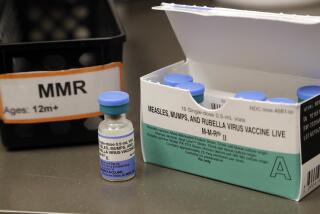The anti-vaccination peril
Contrary to what baby boomers might assume, the term “conscientious objector” didn’t originate with the Vietnam War. It was first used in the late 19th century to describe opponents of England’s mandatory smallpox vaccinations, who received special exemption from the inoculations.
Their opposition to the vaccine was as shortsighted, and as unfounded in science, as the objections of parents today who refuse to recognize the importance of inoculation not just to their children but to public health. As it happens, the popular embrace of the smallpox vaccine eradicated the deadly disease worldwide by the late 1970s. Shortly afterward, polio was eliminated in the United States after a decades-long immunization campaign.
Yet several other diseases — not as deadly as smallpox and polio but still capable of killing — have been making comebacks in recent years as increasing numbers of parents decide that vaccination is dangerous. It started with the now-discredited claims of a British doctor who published a faulty study purportedly showing a link between vaccines and autism.
As The Times has reported, there were nearly 9,500 cases of whooping cough last year in California alone, the most in 65 years. Cases of other diseases — measles and Hib — are rising, though in far smaller numbers. Many measles cases are “imported” from countries where the disease is more prevalent, often by unvaccinated U.S. residents who return from foreign travel.
It would be one thing if these diseases affected only the children whose parents object to vaccines. But if those children get sick, they put many others at risk, including those who cannot be immunized for medical reasons, who don’t respond to vaccines or who aren’t old enough to be inoculated. (Of the 10 infants who died of whooping cough in California last year, nine were too young to have been vaccinated.) All of these children are endangered by the unfounded fears of a small minority of parents. Public health depends on “herd immunity” — the inoculation of enough people to keep a disease from the larger community.
Although children are supposed to receive most vaccinations before starting kindergarten, almost all states rightly allow exemptions for religious reasons or when a child has medical problems that make vaccination impossible. But 21 states, including California, also allow exemptions when parents declare that vaccination is contrary to their personal beliefs. According to the Center for Bioethics at the University of Pennsylvania, more exemptions for nonmedical reasons are granted in states that make allowances for personal beliefs or where the exemption process is particularly lax. States, including California, should be reexamining the personal belief exemption and tightening procedures. It should not be so easy for relatively few people to jeopardize the health of many others.
More to Read
A cure for the common opinion
Get thought-provoking perspectives with our weekly newsletter.
You may occasionally receive promotional content from the Los Angeles Times.






